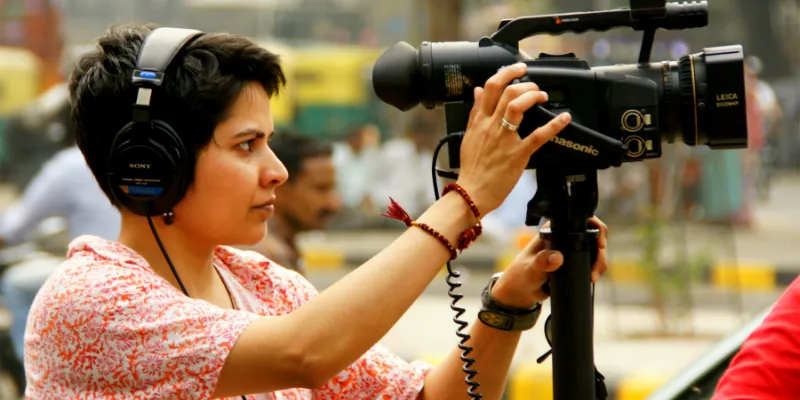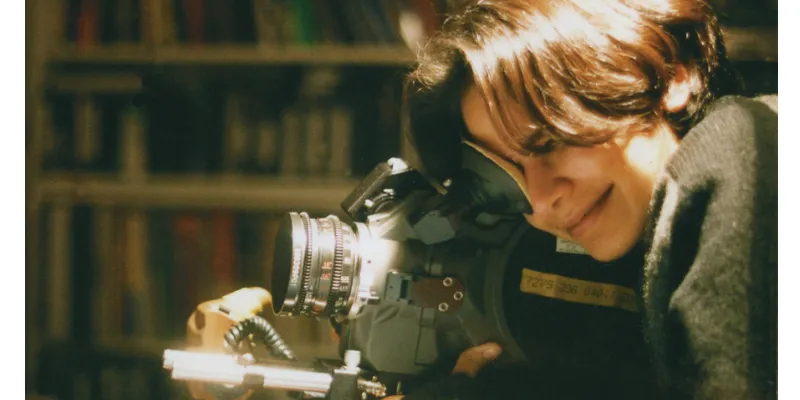“I had unfinished business of not coming out to my mother” - film-maker Sonali Gulati on pouring her lesbian and racial identites onto her reels
In the myopic world that we are compelled to call home, being born as a woman in itself feels like trying to fly with your wings clipped. It is a part of our identity that we have to defend tirelessly everyday. The plot only thickens when you have to guard the sanctity of your sexuality, race, and career choices as well, and reconcile it constantly with the gendered expectations the world has of you. But Delhi-born Virginia-Based award-winning documentary film-maker Sonali Gulati, who is also a feminist, grassroots activist, and champion of women and LGBTQ issues through her all-powerful lens, now co-parents a child with her partner, unfazed by the trolls that are constantly conspiring to break her spirit.

Of Delhi and Diaspora
Growing up in New Delhi, Sonali was acutely aware of what it meant to be a woman. Navigating public spaces was a daily battle. “I learned to ignore men whistling on the streets or elbowing them really hard when they tried to grope women on the bus.” She moved to the US, this time, much more acutely aware of her race as a brown-skinned person.
Her interest in film-making sprouted when she took a Visual Anthropology course as an undergraduate. “I noticed how films about ‘the other’ were made by people living in the west –mostly white men – who had the resources to make such films. I wondered what would happen if the people living in these developing countries could tell their own story. How different would they be? I began to think about the power of self-representation and in telling one’s own story.”
Sonali had often watched films based on certain issues that catapulted her into action. When the time came for her to pick up the camera, she aspired to make similarly thought-provoking films, too.“I decided to focus on what only I can say about a certain subject, from my vantage point.”
By virtue of having plural identities, each of which led to a less-than-smooth initiation for Sonali in our dogmatically partisan world, her own vantage point gave her first-hand insight into myriad burning social issues of our time. Her personal life and realities often became the canvas on which she painted the details of her reels.
Nalini by Day, Nancy by Night
A rather commonplace incident led to the idea of her most stellar project, ‘Nalini by day, Nancy by night’.At the time, not many people knew about the outsourcing and off-shoring of jobs to India. “As an Indian living in the US, I have been looked upon as a traitor for abandoning my country and not living there. I remember being called a ‘choco-bar’ once— brown on the outside and white on the inside. But I’m forgiven for not having picked up the American accent and my Indian-ness is considered intact.”
She made ‘Nalini by Day, Nancy by Night’ after she got a phone call from a telemarketer in Delhi while living in Philadelphia. “Here I was an Indian living in the US with an Indian name and accent, and back in India, there were Indians with American names and accents. Ironically, we were all living as per Eastern Standard Time. I was curious how people in these call centres viewed themselves, how other viewed them, and what it meant for someone like me to be viewing them from my vantage point.”
The documentary film is a commentary on identity in the new millennium that intersects diaspora with global outsourcing. It has won an array of awards like the Director’s Choice Award at Black Maria Film and Video Festival 2006, the Ledo Matteoli Award for Best Immigrant Story, and placed first at the Humboldt International Film Festival, International Cinemateca Film Festival, and Rosebud Film and Video Festival.

I AM
As Sonali grew up in the same bigoted society that preached hatred for anything out of the ordinary, she took her time in accepting her sexuality, herself. “I had homophobia and shame around who I was and what I felt. I thought that I was abnormal and hated myself.”
It took her some time to grapple with this revelation, and accept her sexuality. In that time, she mulled over the idea of coming out to her mother several times, but couldn’t bring herself to do it. “I came out to myself when I was 23 and my mother died when I was 25, so I barely had time to even come to terms with my own sexuality in those first few years. I was also afraid of how my mother would react. I had tested the waters by outing one of my friends to her and she thought that she should go see a psychiatrist. So I knew how my mother felt about the subject,” says Sonali.
She decided to take her time until she felt she was ready to have that conversation; but an unexpected turn of events transpired, “I thought that I had time. I didn’t expect my mother to die at the age of 56. It was very sudden. She was murdered in the safety of her own home.”
The other film she made which received with great fanfare, ‘I AM’ was set in this backdrop. “I AM is a result of having the unfinished business of not having been able to come out to my mother. I wanted to talk to others who had come out to their parents, and talk to parents whose children had come out to them. I guess in some way the film was a gift that I would have given to my mother to say that I am not alone and she is not alone in having to go through this experience.”
Trolls and trials
Making films on racism, sexuality with strong feminist themes was a treacherous road. “I’ve met different kinds of people during my film-making experience, and I actually enjoy talking to folks who don’t necessarily agree with me. For instance in my documentary film”I Am”, I interviewed someone who believed that gay people should be stoned to death,” she says. But Sonali never refrained from crossing enemy lines, for she knew how important it was to figure out where the conflict is in a story, to address a problem at its roots.
I AM won close to 14 awards and continues to exhibit extensively.Her films have been screened at nearly 400 film festivals, including venues such as the Hirshhorn Museum, the Museum of Fine Arts in Boston and the National Museum of Women in the Arts, and at film festivals such as the Margaret Mead Film Festival, the Black Maria Film Festival and the Slamdance Film Festival, and even broadcast on television in the US, Canada, Europe, Australia, New Zealand, The Middle East, South Asia and North Africa.
We live in a world of contradictions. A film that wins awards on one day meets ignorance on the very next. “An audience asked at a screening in the Habitat Centre in Delhi, ‘Why do gay people have to make such a big deal about their sexuality in public? Why do they have to march on the streets? What they do in their bedroom is their private business.’ That’s just it. People don’t see how heterosexuality is considered the norm in our society and how heterosexuality is just as public in our society. We see heterosexual couples walking holding hands in a park, but that is not considered flaunting heterosexuality, it’s considered normal. And a few hours of queer people marching openly on the streets is considered such deviant and obtrusive behaviour. People don’t understand that sexuality is not simply what we do in our bedrooms and that sexuality is not simply about who we have sex with (which shouldn’t be confined to bedrooms), but about who we are and how we feel.”
As a strong feminist who is independent and self-empowered; as a lesbian mother, who also happens to be a “woman of colour” who moonlights as an LGBTQ activist when she is living in a country she calls home as much as the one she grew up in – the discrimination she has faced, has as many layers as an onion. But, she didn’t unravel like one.
“People tell me ‘homosexuality is a disease’, my cousins say my mother would have been embarrassed by ‘I AM’. Even as I type this, I know that as a woman in academia I get paid less than my male counterparts. I have been called a “dot-head” and asked to go back to where I came from. Racism, sexism, and homophobia exist; I have a gazillion anecdotes to prove it. I guess one deals with it in a myriad of ways, I make films that will hopefully change their mind. Speaking up has been important because I recognise that I have the privilege of being able to speak up because there are so many who cannot.”
Sonali soldiers on, and rest assured, will continue making films that will show us the light. She is also co-parenting a child with her partner. And this child is already growing up with a prelapsarian, unshackled, and purer outlook.
“I think that the world sees the difference but my child does not, at least not yet. He was playing with a friend the other day who asked him, ‘You have two moms right?’ To my surprise he said, ‘No! I have one mom and one mama’. He then proceeded to ask how many family members she had. She responded, ‘I have one mom and one dad’. And he said, ‘So we’re the same. We both have three people in our family’.”







